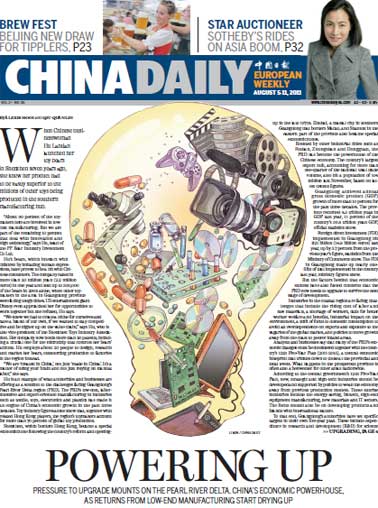Powering up
Updated: 2011-08-05 11:35
By Alexis Hooi and Qiu Quanlin (China Daily)
The high-tech manufacturing industry should also take up 26 percent of industrial output by 2015, up from the 20.6 percent of last year, with more than 800,000 people expected to be involved in the technology sectors by 2015, the authorities say.
Industries targeted for growth under Guangdong's five-year plan include the IT, biomedicine, new energy, LED and new materials sectors. Provincial capital Guangzhou as well as Shenzhen, Zhuhai and Dongguan have also been earmarked to set aside sites for national high-tech industrial bases.
|
|
"It has been doing extremely well in terms of growth and the low-end export economy. But now that the decision has been taken, with the Guangdong government quite clear in saying that it has to 'clean the cage to change the birds', what they want to do is very clear but it will take some time," says Vettoretti, who is also vice-chair of the Pearl River Delta board of the European Chamber of Commerce in China.
Wages are also expected to increase substantially as part of the country's five-year plan, with 13 Chinese municipalities and cities raising their minimum wage by more than 20 percent in the first quarter. Over five years, central authorities plan to gradually increase that by an average of more than 15 percent annually. In Guangzhou, the minimum wage has already been raised to 1,300 yuan a month.
Tony Chen, chairman of furniture company Shunde Uyork Furniture Co in Foshan's Shunde district, says wage increases have slowed down recently but are still increasing by up to 20 percent every year.
"Wage hikes are definitely a concern for us, together with higher cost of materials. But that also means we need to find new avenues for growth, particularly in a 'bricks-and-mortar' industry like ours," he says.
Chen is a major player in Shunde, which has at least 2,000 businesses that help to make Guangdong responsible for one-third of the country's furniture market. The area also contributes half of the country's furniture exports. Uyork, which Chen started 14 years ago, employs more than 500 workers and rakes in about $20 million a year. The European market forms about one-fifth of its business, with domestic consumers making about 60 percent. The rest is from emerging markets like the Middle East and India, Chen says.
But the sector has slowed in the first half of the year and there could be tough times ahead, he says. To stay on top of the game, the entrepreneur is already ramping up ways to promote his brand at home and abroad. These include extensive showrooms linking his brand to "a lifestyle and tapping into Chinese culture, such as the experience of drinking tea in a holistic setting", that go beyond mere tables and chairs to sell his products.
The investment is also a long-term one that requires government support that balances the need for an open market and level-playing field, he says.
"That is still the best way to encourage innovation and fuel growth," Chen says.
In Zengcheng, a suburb of Guangzhou known for its jeans industry, businesses large and small are also battling rising wages and production costs.
More than 3,000 major jeans producers operate from Zengcheng, with nearly 90 percent of them operating in Xintang township. Together, they can churn out about 200 million garments annually or more than half of the jeans for domestic consumers and about one-third of China's denim exports.
Conshing Group, one of the largest players in Xintang, alone hires about 3,000 workers on its 32-hectare site and can produce more than 50,000 pairs of jeans a day. The company reaps about 300 million yuan a year from the domestic market.
But Landy Wu, Conshing's human resources and administration manager, says the company is also focusing on worker welfare and the environment as part of efforts to upgrade its business.
E-paper

Double vision
Prosperous Hangzhou banks on creative energies to bridge traditional and modern sectors
Minding matters
A touch of glass
No longer going by the book
Specials

Ancient plate broken
An ancient porcelain plate was accidentally destroyed during a research in the Palace Museum.

Selfless actions
A 20-year-old girl becomes an Internet star for giving her first kiss to a drowning old man.

Space race
Homebuyers are learning the hard facts of supply and demand: too many cars and too few parking spaces.

